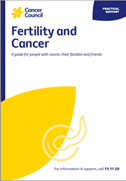- Home
- About Cancer
- Managing side effects
- Fertility and cancer
- Female options before cancer treatment
Female options before cancer treatment
In this section we look at ways you can preserve your fertility before starting cancer treatment. It’s ideal to discuss the options with your cancer or fertility specialist or oncofertility specialist at this time.
Keep in mind that these methods don’t work all of the time.
Learn more about:
Discussing your options
If you didn’t have an opportunity to discuss your options before starting cancer treatment, you can still consider your fertility later, but there may not be as many options available.
For more on discussing your options, see Checking fertility after cancer treatment, Other ways to be a parent and Not having a child.
Ways to preserve fertility in females
Wait and see
| What this is |
|
| When this is used |
|
| How this works |
|
| What to consider |
|
| Pregnancy rate |
|
Freezing eggs or embryo freezing (cryopreservation)
| What this is |
|
| When this is used |
|
| How this works |
|
| What to consider |
|
| Pregnancy rate |
|
Freezing ovarian tissue (cryopreservation)
| What this is |
|
| When this is used |
|
| How this works |
|
| What to consider |
|
| Pregnancy rate |
|
Ovarian transposition (oophoropexy)
| What this is |
|
| When this is used |
|
| How this works |
|
| What to consider |
|
| Pregnancy rate |
|
Fertility-sparing surgery (e.g. trachelectomy, unilateral-salpin oophorectomy)
| What this is |
|
| When this is used |
|
| How this works |
|
| What to consider |
|
| Pregnancy rate |
|
GnRH analogue treatment (ovarian suppression)
| What this is |
|
| When this is used |
|
| How this works |
|
| What to consider |
|
| Pregnancy rate |
|
→ READ MORE: How in-vitro fertilisation works
Read personal stories from women who have been diagnosed with cancer while pregnant
Podcast: Sex and Cancer
Listen to more of our podcast for people affected by cancer
More resources
Prof Martha Hickey, Professor of Obstetrics and Gynaecology, The University of Melbourne and Director, Gynaecology Research Centre, The Royal Women’s Hospital, VIC; Dr Sally Baron-Hay, Medical Oncologist, Royal North Shore Hospital and Northern Cancer Institute, NSW; Anita Cox, Cancer Nurse Specialist and Youth Cancer Clinical Nurse Consultant, Gold Coast University Hospital, QLD; Kate Cox, McGrath Breast Health Nurse Consultant, Gawler/ Barossa Region, SA; Jade Harkin, Consumer; A/Prof Yasmin Jayasinghe, Director Oncofertility Program, The Royal Children’s Hospital, Chair, Australian New Zealand Consortium in Paediatric and Adolescent Oncofertility, Senior Research Fellow, The Royal Women’s Hospital and The University Of Melbourne, VIC; Melissa Jones, Nurse Consultant, Youth Cancer Service SA/NT, Royal Adelaide Hospital, SA; Dr Shanna Logan, Clinical Psychologist, The Hummingbird Centre, Newcastle West, NSW; Stephen Page, Family Law Accredited Specialist and Director, Page Provan, QLD; Dr Michelle Peate, Program Leader, Psychosocial Health and Wellbeing Research (emPoWeR) Unit, Department of Obstetrics and Gynaecology, The Royal Women’s Hospital and The University of Melbourne, VIC; Pampa Ray, Consumer; Prof Jane Ussher, Chair, Women’s Health Psychology, and Chief Investigator, Out with Cancer study, Western Sydney University, NSW; Prof Beverley Vollenhoven AM, Carl Wood Chair, Department of Obstetrics and Gynaecology, Monash University and Director, Gynaecology and Research, Women’s and Newborn, Monash Health and Monash IVF, VIC; Lesley Woods, 13 11 20 Consultant, Cancer Council WA.
View the Cancer Council NSW editorial policy.
View all publications or call 13 11 20 for free printed copies.
Need to talk?
Support services
Coping with cancer?
Speak to a health professional or to someone who has been there, or find a support group or forum
Need legal and financial assistance?
Pro bono services, financial and legal assistance, and no interest loans
Cancer information
Sexuality, intimacy and cancer
This is for people with cancer and their partners. It aims to help you understand and deal with the ways cancer and its treatment may affect your sexuality.
Dealing with the diagnosis
Common reactions to a cancer diagnosis and how to find hope

